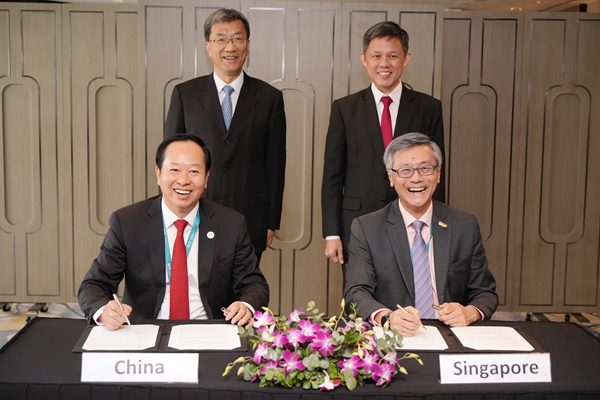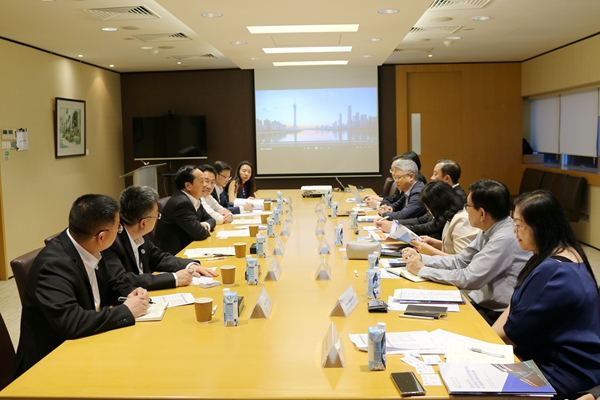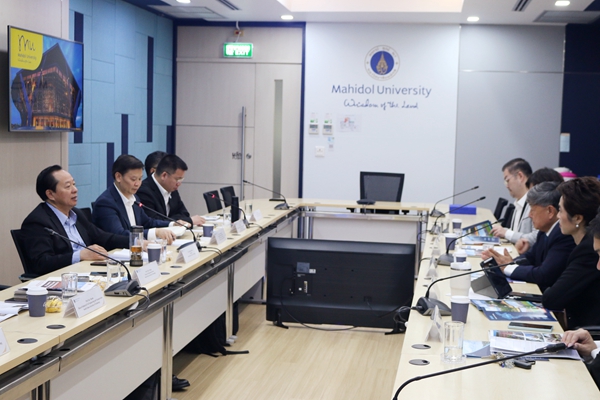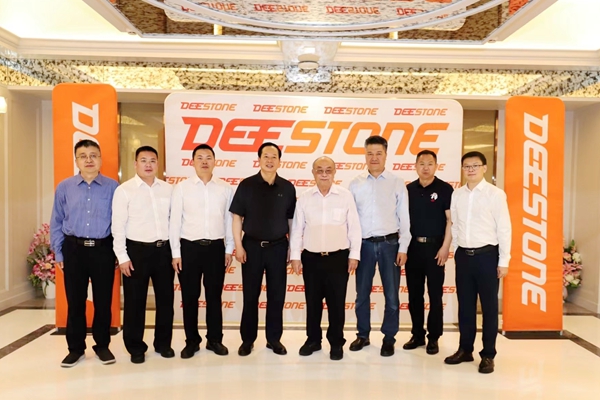To deepen strategic cooperation in education, science and technology, and humanities with countries ofthe Belt and Road Initiative, actively respond to and implement the consensus reached by the leaders of China and Singapore, further consolidate and develop theChina-ASEAN comprehensive strategic partnership, Zhang Xichun, Chancellor of SCUT, was invited to lead a delegation to visit Singapore and Thailand recently. During the visit, Zhang Xichun and his delegation had in-depth exchanges with universities such as the National University of Singapore (NUS), Nanyang Technological University (NTU), Mahidol University (MU), and Chiang Mai University (CMU) and signed relevant memorandums of understanding, serving SCUT's strategies of Internationalization at Home and Two Way Approach to Internationalization, which will inject momentum into the higher-quality and more forward-looking cooperation between SCUT and universities in countries ofthe Belt and Road Initiative. The international influence of SCUT will be greatly improved after this visit.

SCUT and NUS Signed the Memorandum of Understanding
During the visit, the Chancellor of SCUT, Zhang Xichun, and President Tan Eng Chye of NUS signed a university-level memorandum of understanding witnessed by Chinese Minister of Education Huai Jinpeng and Singapore’s Minister for Education Chan Chun Sing. This formalized a comprehensive strategic partnership between SCUT and NUS, with important agreements reached on talent cultivation, joint research, innovation and entrepreneurship, and overseas schools. Both parties will fully leverage the international innovation and high-quality education resources, as well as the advantages of talent hubs and alumni resources in the Guangdong-Hong Kong-Macao Greater Bay Area (GBA) and Singapore, rely on the National Outstanding Engineers School, the China-Singapore International Joint Research Institute, and the NUS (Guangzhou) Research Translation and Innovation Institute to co-build the China-Singapore Joint Innovation Centers in Guangzhou ang Singapore as well and be dedicated to jointly cultivating top-notch innovative talents, aiming to improve the transformation of high-level achievements at home and abroad, further drive cooperation between universities in the GBA and surrounding areas with universities in Singapore, and thereby strive to become a leading model of the cooperation between China-ASEAN universities.

Meeting with NTU
At NTU, the delegation held a meeting with Vice President (Innovation & Entrepreneurship) Louis PHEE and others. The two sides reviewed the fruitful cooperation achievements in teaching and scientific research and unanimously agreed to strengthen two-way student exchanges and promote talent training models such as 3+1+X, implementing NTU's overseas internship program in the GBA and SCUT. They two sides expressed their intention to fully leverage the resource advantages of the two universities in education, science and technology, talent, and alumni, deepen cooperation in four major areas: environmental systems, human systems, energy systems, and urban systems, and jointly conduct cutting-edge research, so as to contribute wisdom and strength to the prosperity and development of China and Singapore.
Zhang Xichun also accompanied Huai Jinpeng to visit several institutions and universities in Singapore, including the NUS, the National Research Foundation, Singapore, and the Campus for Research Excellence and Technological Enterprise, during which held discussions with renowned scientists in Singapore.

Meeting with MU
In Thailand, the delegation was warmly received by President Banchong Mahaisavariya and Vice President Nopraenue Sajjarax Dhirathiti of MU. Zhang Xichun introduced the latest developments in the running of SCUT and hoped to further expand joint training programs with MU, promoting the integration, sharing, and win-win outcomes of educational resources together.
Banchong Mahaisavariya attached great importance to the exchange and cooperation with SCUT. Building on the existing collaboration, he looked forward to expanding cooperation in fields of engineering such as new energy vehicles, civil transportation, and the environment, further establishing a cooperation mechanism in various forms, interdisciplinary studies and deep levels.

SCUT and CMU Signed the Memorandum of Understanding
At CMU, on behalf of President Pongruk Sribanditmongkol, Vice President Ekkachai Mahaek signed a university-level memorandum of understanding with Zhang Xichun. The two sides reached a consensus on industry-university cooperation in fields such as using bamboo as a substitute for plastic, low-carbon papermaking, and wood-pulp-paper integration and jointly applied for the establishment of a Belt and Road Joint Laboratory. The two sides will conduct research on wood-pulp-paper integration focusing on high-quality bamboo species in Thailand, which will promote China’s strategies of bamboo as a substitute for plastic and paper as a substitute for plastic, and make contributions to China’s dual carbon goals and global carbon neutrality.
Zhang Xichun stated that SCUT and MCU have carried out in-depth and fruitful cooperation in the fields of Architecture and Light Industry, especially the Guangdong-Hong Kong-Macao Greater Bay Area·ASEAN International Colleges Design and Construction Competition, which has become an important bridge for exchanges between SCUT and universities in countries of the Belt and Road Initiative and also a brand activity for the establishment of friendly-city relations between Guangzhou and Chiang Mai. Next, focusing on jointly building the Belt and Road Joint Laboratory, they will promote cooperation between the two universities and even between China and Thailand. Ekkachai Mahaek expressed the hope to establish a regular exchange mechanism based on the establishment of university-level cooperation, actively promote two-way exchanges for faculty and students, and deepen pragmatic cooperation in multiple disciplines.
The delegation also visited the Faculty of Architecture at CMU and exchanged views with pairing majors such as Light Industry and Engineering, Food Science and Technology, and Civil Engineering and Transportation, laying a solid foundation for further expanding cooperation between the two sides.

Visiting the Enterprise Founded by Wang Xingsheng - Alumni from the Class of 1968
During the visit, the delegation also held discussions with representatives of well-known alumni in Singapore and Thailand and visited alumni-owned enterprises.
This year marks the beginning of the second decade of the joint contribution of the Belt and Road Initiative. This visit, as an important measure for SCUT to expand and deepen the cooperation network of the Belt and Road Initiative, will further promote high-quality and forward-looking educational cooperation between SCUT and first-class universities in Singapore and Thailand and expand the international “circle of friends.” It also plays an essential role in advancingthe construction of “Double First Class” university and the Guangzhou International Campus (GZIC), accelerating to build SCUT into a world-class university with Chinese characteristics.
Directors and relevant representatives from Organizing Division, Office of Global Affairs of GZIC, the School of Civil Engineering and Transportation, the School of Light Industry and Engineering, the School of Food Science and Engineering, and the Guangzhou Institute of Modern Industrial Technology accompanied the visit.
Translator: Yaxin Zhang
Initial Proofreader: Sheng Gao
Final Proofreader: Zhaosheng Wu





